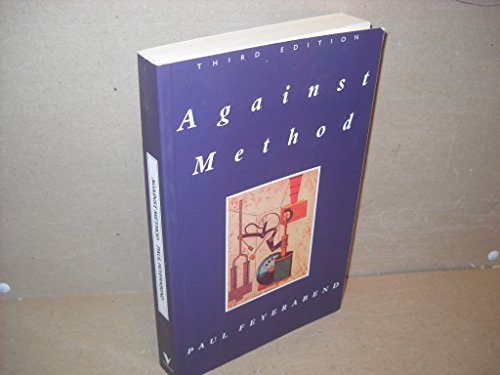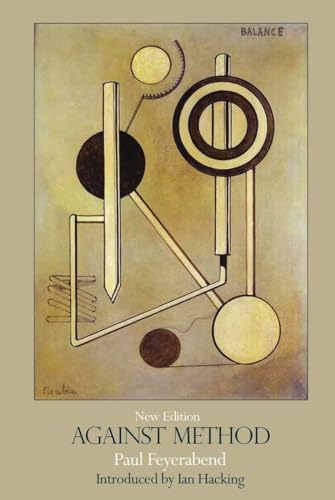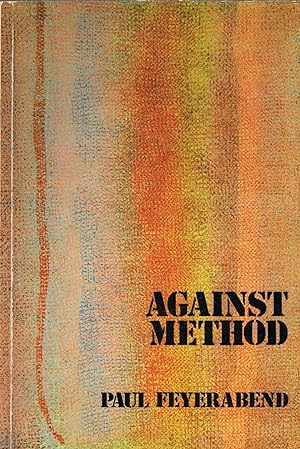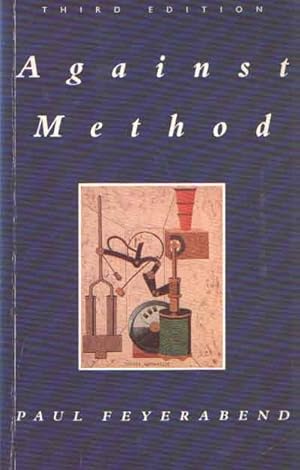Against Method Outline Anarchistic Theory by Feyerabend Paul (36 results)
FeedbackSearch filters
Product Type
- All Product Types
- Books (36)
- Magazines & Periodicals (No further results match this refinement)
- Comics (No further results match this refinement)
- Sheet Music (No further results match this refinement)
- Art, Prints & Posters (No further results match this refinement)
- Photographs (No further results match this refinement)
- Maps (No further results match this refinement)
- Manuscripts & Paper Collectibles (No further results match this refinement)
Condition Learn more
Binding
Collectible Attributes
- First Edition (No further results match this refinement)
- Signed (No further results match this refinement)
- Dust Jacket (4)
- Seller-Supplied Images (12)
- Not Print on Demand (33)
Language (3)
Free Shipping
Seller Location
Seller Rating
-
Condition: Good. Good condition. A copy that has been read but remains intact. May contain markings such as bookplates, stamps, limited notes and highlighting, or a few light stains.
-
Against Method: Outline of an Anarchistic Theory of Knowledge
Seller: Greenworld Books, Arlington, TX, U.S.A.
Condition: good. Fast Free Shipping â" Good condition book with a firm cover and clean, readable pages. Shows normal use, including some light wear or limited notes highlighting, yet remains a dependable copy overall. Supplemental items like CDs or access codes may not be included.
-
paperback. Condition: Very Good. Connecting readers with great books since 1972! Used books may not include companion materials, and may have some shelf wear or limited writing. We ship orders daily and Customer Service is our top priority!
-
Against Method: Outline of an Anarchistic Theory of Knowledge
Seller: Bay State Book Company, North Smithfield, RI, U.S.A.
Condition: acceptable. The book is complete and readable, with all pages and cover intact. Dust jacket, shrink wrap, or boxed set case may be missing. Pages may have light notes, highlighting, or minor water exposure, but nothing that affects readability. May be an ex-library copy and could include library markings or stickers.
-
Against Method: Outline of an Anarchistic Theory of Knowledge
Seller: ebooks Keystone, Reading, PA, U.S.A.
Condition: good. This book is in good condition, with minimal signs of wear and tear.
-
Against Method: Outline of an Anarchistic Theory of Knowledge
Seller: Goodwill of Silicon Valley, SAN JOSE, CA, U.S.A.
Condition: acceptable. Supports Goodwill of Silicon Valley job training programs. The cover and pages are in Acceptable condition! Any other included accessories are also in Acceptable condition showing use. Use can include some highlighting and writing, page and cover creases as well as other types visible wear such as cover tears discoloration, staining, marks, scuffs, etc. All pages intact.
-
Against Method: Outline of an Anarchistic Theory of Knowledge
Seller: de Wit Books, HUTCHINSON, KS, U.S.A.
Soft cover. Condition: Fair. Cover crease; Fair to Good, unmarked Paperback.
-
Against Method: Outline of an Anarchistic Theory of Knowledge
Seller: de Wit Books, HUTCHINSON, KS, U.S.A.
Soft cover. Condition: Fair. Cover crease; Fair to Good, unmarked Paperback.
-
Against Method: Outline of an Anarchistic Theory of Knowledge
Seller: Uncle Hugo's SF/Uncle Edgar's Mystery, Minneapolis, MN, U.S.A.
Soft cover. Condition: Good. 3rd Edition. There is some corner wear and a bit of edge wear and scuffing; there is sticker residue on the back cover.
-
Against Method: Outline of an Anarchistic Theory of Knowledge
Seller: Solr Books, Lincolnwood, IL, U.S.A.
Condition: good. This book is in Good condition. There may be some notes and highligting but otherwise the book is in overall good condition.
-
Against Method: Outline of an Anarchistic Theory of Knowledge
Seller: WorldofBooks, Goring-By-Sea, WS, United Kingdom
US$ 18.83
Convert currencyUS$ 7.53 shipping from United Kingdom to U.S.A.Quantity: 2 available
Add to basketPaperback. Condition: Very Good. The book has been read, but is in excellent condition. Pages are intact and not marred by notes or highlighting. The spine remains undamaged.
-
Against Method: Outline of An Anarchistic Theory of Knowledge
Seller: Anybook.com, Lincoln, United Kingdom
US$ 11.06
Convert currencyUS$ 17.40 shipping from United Kingdom to U.S.A.Quantity: 1 available
Add to basketCondition: Poor. This is an ex-library book and may have the usual library/used-book markings inside.This book has soft covers. In poor condition, suitable as a reading copy. Please note the Image in this listing is a stock photo and may not match the covers of the actual item,450grams, ISBN:0860917002.
-
Against Method: Outline of an Anarchistic Theory of Knowledge
Seller: Brook Bookstore On Demand, Napoli, NA, Italy
US$ 26.32
Convert currencyUS$ 6.45 shipping from Italy to U.S.A.Quantity: Over 20 available
Add to basketCondition: new.
-
Against Method: Outline of an Anarchistic Theory of Knowledge
Seller: Salsus Books (P.B.F.A.), Kidderminster, United Kingdom
Association Member: PBFA
US$ 12.46
Convert currencyUS$ 20.16 shipping from United Kingdom to U.S.A.Quantity: 1 available
Add to basketSoft cover. Condition: Good. 2nd Edition. 339pp paperback, good.
-
Against Method: Outline of an Anarchistic Theory of Knowledge
Seller: HALCYON BOOKS, LONDON, United Kingdom
US$ 9.25
Convert currencyUS$ 24.20 shipping from United Kingdom to U.S.A.Quantity: 1 available
Add to basketPaperback. Condition: Very Good. ALL ITEMS ARE DISPATCHED FROM THE UK WITHIN 48 HOURS ( BOOKS ORDERED OVER THE WEEKEND DISPATCHED ON MONDAY) ALL OVERSEAS ORDERS SENT BY TRACKABLE AIR MAIL. IF YOU ARE LOCATED OUTSIDE THE UK PLEASE ASK US FOR A POSTAGE QUOTE FOR MULTI VOLUME SETS BEFORE ORDERING.
-
Against Method: Outline of An Anarchistic Theory of Knowledge
Seller: Anybook.com, Lincoln, United Kingdom
US$ 16.90
Convert currencyUS$ 17.40 shipping from United Kingdom to U.S.A.Quantity: 1 available
Add to basketCondition: Good. This is an ex-library book and may have the usual library/used-book markings inside.This book has soft covers. In good all round condition. Please note the Image in this listing is a stock photo and may not match the covers of the actual item,400grams, ISBN:0860917002.
-
Against Method: Outline of an Anarchistic Theory of Knowledge Feyerabend, Paul
Seller: boredom books, Portland, OR, U.S.A.
Paperback. Condition: Clean & Unmarked. A very nice clean straight & tight copy. 279 pp.
-
AGAINST METHOD. Outline of an anarchistic * theory of knowledge
Language: Spanish
Seller: Librería Torreón de Rueda, Segovia, SG, Spain
US$ 9.67
Convert currencyUS$ 18.78 shipping from Spain to U.S.A.Quantity: 1 available
Add to basketEncuadernación de tapa blanda. Condition: Aceptable. . (illustrator). London. Verso Edit. 1980. 3ª edic. 20x13 cm. 339 págs. texto en inglés. # filosofía.
-
Condition: as new. pbk 339pp prev owner has reinforced corners with invisible tape otherwise an excellent clean tight unmarked copy as new.
-
Against Method: Outline of an Anarchistic Theory of Knowledge
Seller: Ria Christie Collections, Uxbridge, United Kingdom
US$ 40.34
Convert currencyUS$ 16.10 shipping from United Kingdom to U.S.A.Quantity: Over 20 available
Add to basketCondition: New. In.
-
Against Method: Outline of an Anarchistic Theory of Knowledge
Seller: Toscana Books, AUSTIN, TX, U.S.A.
Paperback. Condition: new. Excellent Condition.Excels in customer satisfaction, prompt replies, and quality checks.
-
Paperback. Condition: new. New Copy. Customer Service Guaranteed.
-
Paperback. Condition: new. New Copy. Customer Service Guaranteed.
-
Against Method: Outline of an Anarchistic Theory of Knowledge
Seller: BennettBooksLtd, San Diego, NV, U.S.A.
paperback. Condition: New. In shrink wrap. Looks like an interesting title!
-
Against Method : Outline of an Anarchistic Theory of Knowledge
Published by Verso Books Mai 2010, 2010
ISBN 10: 1844674428 ISBN 13: 9781844674428
Language: English
Seller: AHA-BUCH GmbH, Einbeck, Germany
US$ 29.49
Convert currencyUS$ 72.27 shipping from Germany to U.S.A.Quantity: 1 available
Add to basketTaschenbuch. Condition: Neu. Neuware - Paul Feyerabend's globally acclaimed work, which sparked and continues to stimulate fierce debate, examines the deficiencies of many widespread ideas about scientific progress and the nature of knowledge. Feyerabend argues that scientific advances can only be understood in a historical context. He looks at the way the philosophy of science has consistently overemphasized practice over method, and considers the possibility that anarchism could replace rationalism in the theory of knowledge.This updated edition of the classic text includes a new introduction by Ian Hacking, one of the most important contemporary philosophers of science. Hacking reflects on both Feyerabend's life and personality as well as the broader significance of the book for current discussions.
-
Condition: new.
-
Against Method: Outline of an Anarchistic Theory of Knowledge
Seller: BennettBooksLtd, San Diego, NV, U.S.A.
paperback. Condition: New. In shrink wrap. Looks like an interesting title!
-
Against method : outline of art anarchistic theory of knowledge
Published by Verso, London, 1997
Seller: Bij tij en ontij ..., Kloosterburen, NL, Netherlands
US$ 35.66
Convert currencyUS$ 33.45 shipping from Netherlands to U.S.A.Quantity: 1 available
Add to basketPaperback, 22 cm, 197 pp. Ills.: black and white illustrations. Cond.: goed / good. ISBN: 0860916464.
-
Against Method : Outline of an Anarchistic Theory of Knowledge
Published by NLB [New Left Books] (1975), London, 1975
ISBN 10: 0902308912 ISBN 13: 9780902308916
Language: English
Seller: Renaissance Books, ANZAAB / ILAB, Dunedin, New Zealand
US$ 100.00
Convert currencyUS$ 45.00 shipping from New Zealand to U.S.A.Quantity: 1 available
Add to basketHardcover. Condition: Good. Dust Jacket Condition: Good. Ex-library. Library stamps and markings, including barcode label on front panel of dust-jacket. Dust-jacket in plastic cover, taped to boards. One leaf of the "Analytical Index" (pages 15-16) is missing, and has been replaced with a photocopied facsimile leaf with adhesive tape at the inner margins. A good working or reading copy.; Second printing, August 1975 (in same year as the first edition). 339, [1 (blank)] pages. [1 leaf (pp.15-16) supplied in facsimile]. Grey boards with silver lettering on spine and front board. Silver publisher's emblem in corner of front board. Page dimensions: 208 x 135mm. This second printing was printed in Great Britain by Lowe & Brydone (Printers) Ltd. This second printing has, added beneath the blurb on the front flap of the dust-jacket, five quotes from reviews of "Against Method". The double title page also lists both the UK and USA publishers - London: NLB and Atlantic Highlands: Humanities Press. An important work in the philosophy of science. "The following essay is written in the conviction that anarchism, while perhaps not the most attractive political philosophy, is certainly excellent medicine for epistemology, and for the philosophy of science." - from the Introduction, page 17. "Modern philosophy of science has paid great attention to an understanding of scientific practice, in contrast to the earlier concentration on 'scientific method'. The work of Karl Popper, Thomas Kuhn and Imre Lakatos has provided varying accounts of what this practice is. Paul Feyerabend goes beyond this position: he argues that the most successful scientific inquiries have never proceeded according to a rational method at all. He examines in detail the arguments which Galileo used to defend the Copernican revolution in physics, and shows that this success depended not on rational argument but on a mixture of subterfuge, rhetoric and propaganda. His conclusion: 'Galileo cheated'. Claiming that anarchism must now replace rationalism in the theory of knowledge, Feyerabend argues that intellectual progress can only be achived by stressing the creativity and wishes of the scientist rather than the method and authority of science. In the latter half of the book he examines Popper's 'critical rationalism', and the attempt by Lakatos to construct a methodology which allows the scientist his freedom without threatening scientific 'law and order'. Rejecting both attempts to shore up rationalism he looks forward to the 'withering away of reason' and maintains that 'the only principle which does not inhibit progress is 'anything goes'." - from dust-jacket blurb. "A devastating attack on the claims of philosophy of science to legislate for scientific practice.' - New Society review, quoted on dust-jacket. "Feyerabend's excellent book will be as stimulating to this decade as Kuhn's was to the last." - Tribune review, quoted on dust-jacket. [References: Stanford Encyclopedia of Philosophy (online), "Paul Feyerabend" accessed November 2020 - "Instead of the volume written jointly with Lakatos, Feyerabend put together his tour de force, the book version of 'Against Method' (London: New Left Books, 1975), which he sometimes conceived of as a letter to Lakatos (to whom the book is dedicated). A more accurate description, however, is the one given in his autobiography: 'AM is not a book, it is a collage. It contains descriptions, analyses, arguments that I had published, in almost the same words, ten, fifteen, even twenty years earlier [. . .] I arranged them in a suitable order, added transitions, replaced moderate passages with more outrageous ones, and called the result "anarchism". I loved to shock people [. . .]'"].
-
Against Method : Outline of an Anarchistic Theory of Knowledge
Published by NLB [New Left Books] (1975), London, 1975
ISBN 10: 0902308912 ISBN 13: 9780902308916
Language: English
Seller: Renaissance Books, ANZAAB / ILAB, Dunedin, New Zealand
US$ 150.00
Convert currencyUS$ 45.00 shipping from New Zealand to U.S.A.Quantity: 1 available
Add to basketHardcover. Condition: Very Good. Dust Jacket Condition: Very Good-. No signatures. Vertical creasing to dust-jacket spine. 10mm stain at tail of dust-jacket spine. Dust-jacket protected in archival mylar cover.; Second printing, August 1975 (in same year as the first edition). 339, [1 (blank)] pages. [1 leaf (pp.15-16) supplied in facsimile]. Grey boards with silver lettering on spine and front board. Silver publisher's emblem in corner of front board. Page dimensions: 208 x 136mm. This second printing was printed in Great Britain by Lowe & Brydone (Printers) Ltd. This second printing has, added beneath the blurb on the front flap of the dust-jacket, five quotes from reviews of "Against Method". The double title page also lists both the UK and USA publishers - London: NLB and Atlantic Highlands: Humanities Press. An important work in the philosophy of science. "The following essay is written in the conviction that anarchism, while perhaps not the most attractive political philosophy, is certainly excellent medicine for epistemology, and for the philosophy of science." - from the Introduction, page 17. "Modern philosophy of science has paid great attention to an understanding of scientific practice, in contrast to the earlier concentration on 'scientific method'. The work of Karl Popper, Thomas Kuhn and Imre Lakatos has provided varying accounts of what this practice is. Paul Feyerabend goes beyond this position: he argues that the most successful scientific inquiries have never proceeded according to a rational method at all. He examines in detail the arguments which Galileo used to defend the Copernican revolution in physics, and shows that this success depended not on rational argument but on a mixture of subterfuge, rhetoric and propaganda. His conclusion: 'Galileo cheated'. Claiming that anarchism must now replace rationalism in the theory of knowledge, Feyerabend argues that intellectual progress can only be achived by stressing the creativity and wishes of the scientist rather than the method and authority of science. In the latter half of the book he examines Popper's 'critical rationalism', and the attempt by Lakatos to construct a methodology which allows the scientist his freedom without threatening scientific 'law and order'. Rejecting both attempts to shore up rationalism he looks forward to the 'withering away of reason' and maintains that 'the only principle which does not inhibit progress is 'anything goes'." - from dust-jacket blurb. "A devastating attack on the claims of philosophy of science to legislate for scientific practice.' - New Society review, quoted on dust-jacket. "Feyerabend's excellent book will be as stimulating to this decade as Kuhn's was to the last." - Tribune review, quoted on dust-jacket. [References: Stanford Encyclopedia of Philosophy (online), "Paul Feyerabend" accessed November 2020 - "Instead of the volume written jointly with Lakatos, Feyerabend put together his tour de force, the book version of 'Against Method' (London: New Left Books, 1975), which he sometimes conceived of as a letter to Lakatos (to whom the book is dedicated). A more accurate description, however, is the one given in his autobiography: 'AM is not a book, it is a collage. It contains descriptions, analyses, arguments that I had published, in almost the same words, ten, fifteen, even twenty years earlier [. . .] I arranged them in a suitable order, added transitions, replaced moderate passages with more outrageous ones, and called the result "anarchism". I loved to shock people [. . .]'"].
















